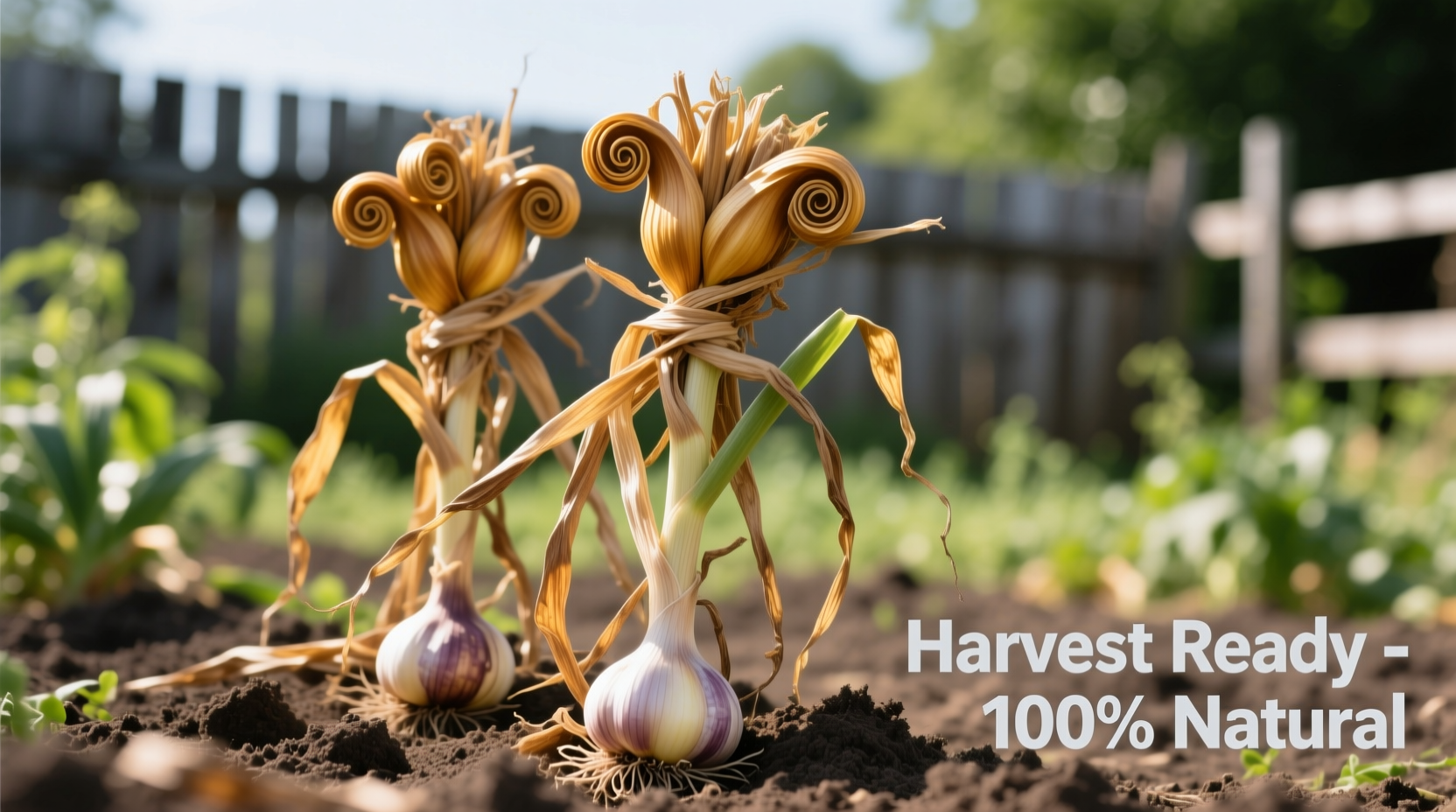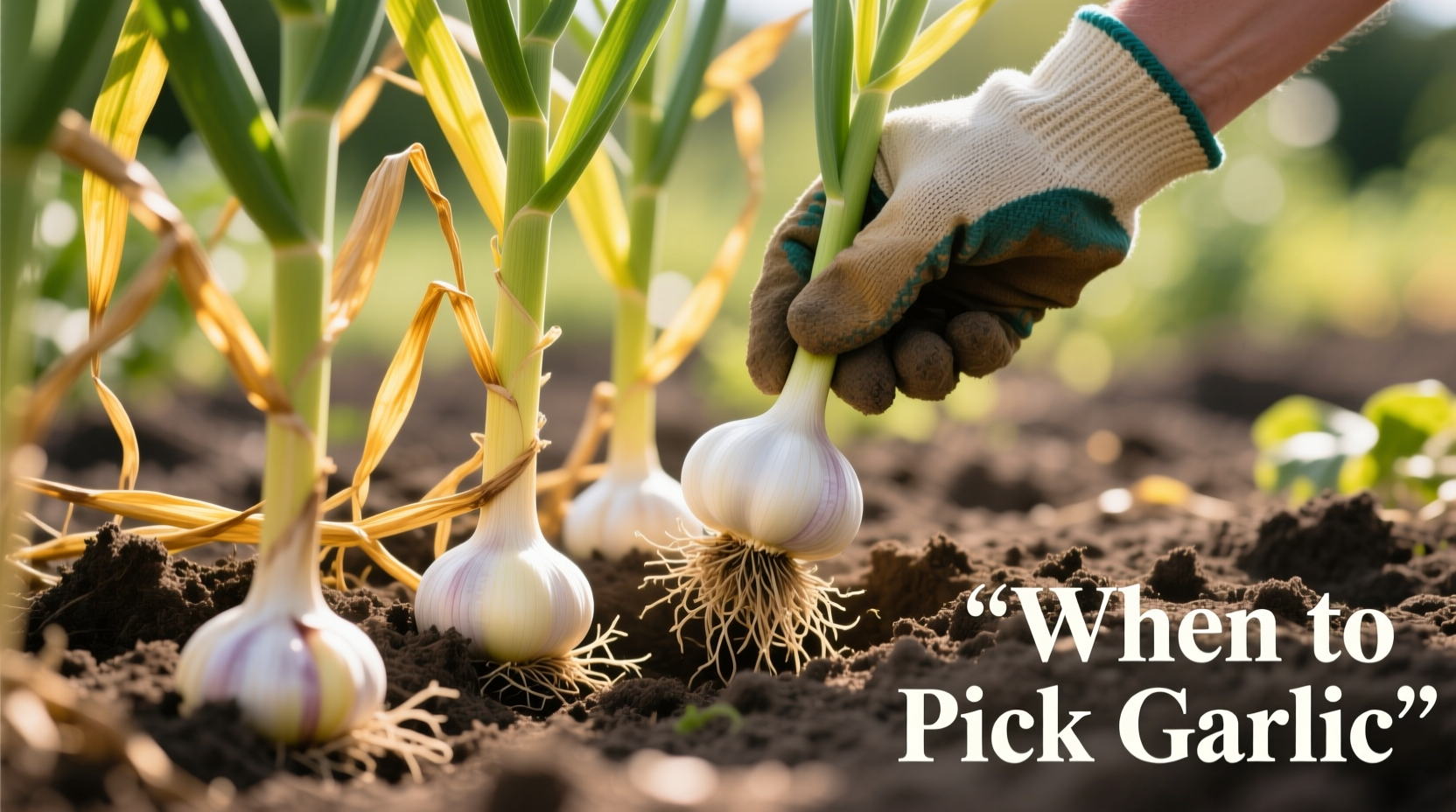Why Timing Matters for Garlic Harvest Success
Getting the harvest timing right makes the difference between plump, well-formed bulbs and disappointing results. Garlic harvested too early produces small cloves with thin wrappers that don't store well. Wait too long, and the bulbs will split open, exposing cloves to disease and reducing shelf life. The optimal harvest window lasts just 7-10 days, making precise timing essential for home gardeners.
Visual Indicators: Reading Your Garlic's Readiness Signals
Garlic communicates its harvest readiness through clear visual cues. Watch for these critical indicators:
- Leaf color progression – When 30-50% of leaves turn brown from the bottom up
- Wrapper condition – Outer bulb wrappers should be intact but beginning to dry
- Soil surface cracks – Mature bulbs often cause visible soil separation around the stem
- Stem firmness – Mature stems become stiff and woody rather than flexible

Harvest Timing by Garlic Type and Climate Zone
Different garlic varieties and growing regions require specific timing approaches. Understanding these variations prevents common harvesting mistakes.
| Garlic Type | Typical Harvest Period | Key Visual Indicators | Regional Adjustments |
|---|---|---|---|
| Hardneck (Rocambole, Porcelain) | 30 days after scape emergence | 4-5 brown lower leaves, scapes curling | Northern zones: Late June-July; Southern zones: May-June |
| Softneck (Silverskin, Artichoke) | When 40-60% leaves brown | Top leaves still green, bulbs firm | Northern zones: July-August; Southern zones: June-July |
| Elephant Garlic | When 50% leaves brown | Flower heads dry, leaves yellowing | Harvest 2-3 weeks earlier than regular garlic |
Step-by-Step Harvesting Process
Follow these professional techniques to maximize your garlic yield and quality:
Preparation Phase
Stop watering 1-2 weeks before expected harvest to begin the curing process in-ground. This critical step improves storage longevity. The University of California Cooperative Extension confirms that reduced moisture triggers natural curing mechanisms that strengthen bulb wrappers.
Harvesting Technique
- Use a garden fork rather than a shovel to minimize bulb damage
- Loosen soil 6-8 inches from the stem in all directions
- Gently lift bulbs without pulling directly on stems
- Brush off excess soil but avoid washing bulbs at this stage
- Leave stems attached for proper curing
Post-Harvest Processing: From Garden to Storage
Proper handling after harvest determines your garlic's storage life. The National Gardening Association reports that correct curing doubles garlic's shelf life compared to improper methods.
Curing Process Timeline
Days 1-7: Hang in shaded, well-ventilated area with 60-70% humidity
Days 8-14: Outer wrappers dry and papery; roots and stems begin to dry
Days 15-21: Complete curing – wrappers rustle when touched, roots brittle
Storage Preparation
After curing, trim roots to 1/4 inch and stems to 1-2 inches. Store in mesh bags or braided in a cool (55-65°F), dark location with good air circulation. Properly cured garlic maintains quality for 6-8 months.
Avoiding Common Harvest Mistakes
Even experienced gardeners make these critical errors that compromise garlic quality:
- Harvesting during wet conditions – Increases mold risk; wait 3-5 dry days after rain
- Leaving bulbs in sun after harvest – Causes premature sprouting; move to shade immediately
- Washing before curing – Traps moisture leading to rot; dry brushing only
- Improper curing environment – Avoid direct sun and high humidity areas
Regional Harvest Timing Adjustments
Climate significantly impacts garlic maturity. The USDA Plant Hardiness Zone Map provides essential guidance for timing adjustments:
- Zones 3-5: Harvest hardneck varieties late June to early July
- Zones 6-7: Harvest hardneck late June, softneck mid-July
- Zones 8-10: Harvest softneck varieties mid-June to early July
According to Cornell University's College of Agriculture, garlic maturity occurs approximately 210-240 days after planting in most temperate regions, with soil temperature being the most reliable indicator rather than calendar dates.
When to Harvest Garlic Scapes
For hardneck varieties, scapes (flower stalks) provide an additional harvest opportunity. Pick scapes when they form their first coil but before straightening. This typically occurs 3-4 weeks before bulb harvest. Removing scapes directs energy to bulb development, increasing final size by 15-25%.
FAQ: Garlic Harvesting Questions Answered
How do I know if I've harvested garlic too early?
Garlic harvested too early shows small cloves with thin, papery wrappers that separate easily. The cloves won't have fully segmented, and the bulb might feel soft rather than firm. Early-harvested garlic has significantly reduced storage life—typically 1-2 months instead of 6-8 months for properly timed harvests.
Can I harvest garlic after it rains?
Avoid harvesting immediately after rain. Wait 3-5 dry days to allow soil moisture to decrease. Wet conditions increase the risk of mold and rot during curing. If you must harvest after rain, extend curing time by 3-5 days and ensure excellent air circulation to prevent spoilage.
What happens if I leave garlic in the ground too long?
Over-mature garlic bulbs will split open, exposing individual cloves to soil pathogens and moisture. The protective wrappers deteriorate, reducing storage life significantly. In severe cases, cloves may begin regrowing roots in the ground. Split bulbs should be used immediately as they won't store well.
Should I cut the leaves before harvesting garlic?
Never cut leaves before harvesting. The leaves continue photosynthesizing until harvest, providing energy to the developing bulb. Cutting leaves prematurely reduces bulb size and quality. After harvest, keep stems and leaves intact during the curing process to allow nutrients to transfer to the bulb.
How long after scapes appear should I harvest garlic?
For hardneck garlic varieties, harvest bulbs approximately 30 days after scape emergence. This timing allows maximum bulb development while preventing over-maturity. Track scape appearance date to determine your precise harvest window, as calendar dates vary significantly by climate zone.











 浙公网安备
33010002000092号
浙公网安备
33010002000092号 浙B2-20120091-4
浙B2-20120091-4